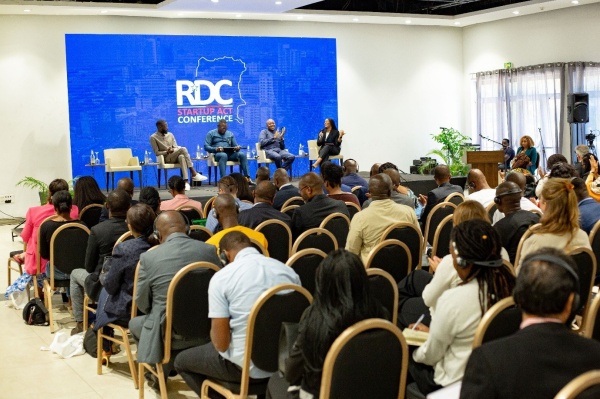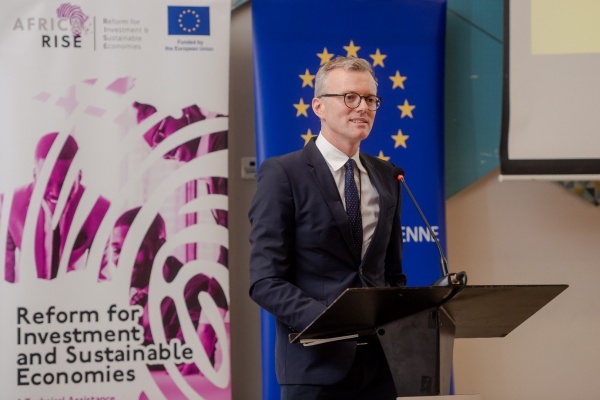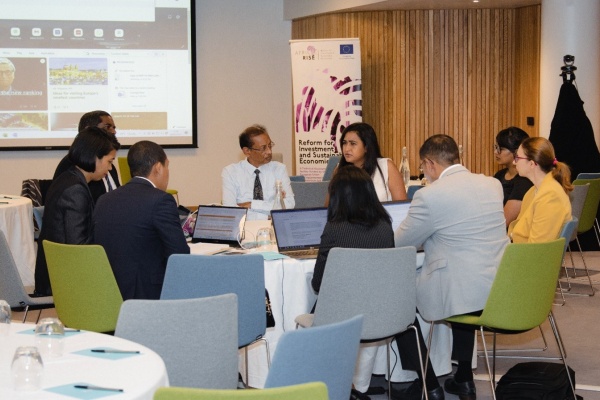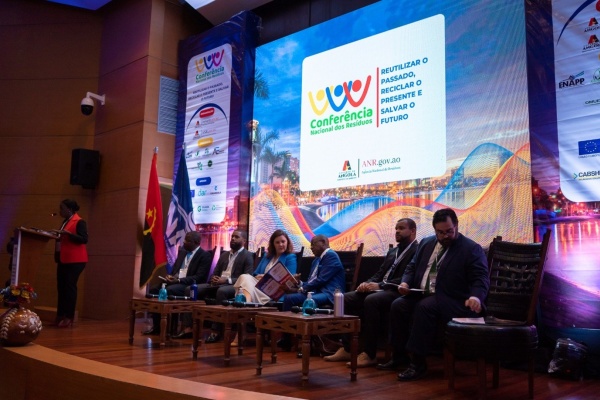Africa RISE (Reform for Investment and Sustainable Economies)
2020 - 2024
Africa RISE (Reform for Investment and Sustainable Economies) was a demand-driven regional technical assistance facility funded by the European Union (EU). It was implemented from 2020-2024 by a consortium led by Landell Mills, with support from Adam Smith Europe, Imani Development and International Economics.

The Africa RISE programme aimed to promote business development and improve the investment climate in Eastern and Southern Africa, and the Indian Ocean. It supported the EU partnership with Africa on sustainable investments and jobs, inclusive green growth and decent work.
A range of services were provided through the Africa RISE programme, including research, analysis, strategy development and implementation, and skills development. Over 4 years, 78 projects were completed under the Africa RISE programme, supporting 50 beneficiaries in 25 countries.
Read on to discover some of the projects that were carried out under the Africa RISE programme.
Angola: Urban Solid Waste Management Strategy
Waste is a social, economic and environmental problem facing all African countries. The Africa RISE programme supported several initiatives to manage waste sustainably.
Each year, Angola produces around 6.4 million tonnes of solid waste, most of which is deposited in open dumps, near watercourses and in residential areas. This aggravates environmental and public health problems, resulting in the urgent need for sustainable waste management approaches.
Experts from the Africa RISE programme analysed the existing situation of solid waste management in Luanda, Angola; and identified and assessed priority circular economy options for municipal solid waste management. Findings from the analysis, as well as best practices identified in Angola and countries with similar parameters, were used to formulate a holistic new programme proposal.
Part of the proposal was a digital app, developed by the Africa RISE team, to support management of the supply and demand of waste and strengthen the solid waste management market. The app was designed to break down the barriers between waste pickers and industries that need waste. It tracks solid waste across the waste value chain, from production to disposal and recycling, and has a traceability and payment system. The app promotes a sustainable and greener digital solution for all waste management system stakeholders to trade freely, with market forces dictating the supply and demand within a solid waste management system.
Contract value of €12,798,000
Funded by the EU
Ran for 4 years
Implemented by a consortium led by Landell Mills
Supported 50 beneficiaries in 25 countries
Across Eastern and Southern Africa, and the Indian Ocean

Democratic Republic of the Congo: Start-Up Act Implementation Support
One of the biggest problems currently facing many African countries is youth unemployment. In some countries, more than half of the population is younger than 25, and there are not enough jobs for all young people entering the employment market.
In response to this issue, the Congolese Government developed the Start-Up Act, which is a law to promote start-ups in the Democratic Republic of the Congo. However, the government required support to disseminate and explain the law to public administrations, and propose technical measures in collaboration with private sector organisations.
To encourage adoption of the Start-Up Act, the Africa RISE team – in partnership with the Embassy of the Kingdom of the Netherlands – hosted a conference in Kinshasa, Democratic Republic of the Congo that brought together pan-African and Congolese entrepreneurs. The objective of the conference was to raise awareness and inform entrepreneurs and other ecosystem players about the recently passed law and the changes it hoped to bring.
During the conference, to support entrepreneurs, experts from the Africa RISE programme presented a comprehensive set of measures for the successful implementation of the Start-Up Act to the Congolese Government. The measures – which were validated by stakeholders in the Congolese start-up ecosystem – covered practical, technical, fiscal and regulatory actions to be taken by national, provincial and local government ministries, departments and agencies.
Madagascar: Peer-to-Peer Learning on Digital Transformation
The Economic Development Board (EDB) of Madagascar submitted a request to the Africa RISE programme for support and capacity-building in the area of digitalisation. Through a strategic partnership between Africa RISE, the EDB of Mauritius and the Regional Multidisciplinary Centre of Excellence (RMCE), a robust platform was established where invaluable insights, best practices and success strategies were shared with the EDB of Madagascar.
In June 2023, an Economist and Market Reform Expert from the Africa RISE programme organised a three-day study tour and peer-to-peer learning event for representatives from the EDB of Madagascar. Topics covered at the event include:
- the prerequisites for digitalisation.
- best practice in digitisation to improve the business climate.
- lessons learnt from the Mauritian experience on digitalisation of key services.
- how to monitor digitisation projects.
Representatives from the EDB of Madagascar were introduced to information and technology systems by various stakeholders from Mauritius, including representatives from the EDB of Mauritius, the Centre for Information Technology and Systems (CITS), the Mauritius Revenue Authority and the Mauritius Digital Promotion Agency. The event also provided the opportunity for representatives from the EDB of Madagascar to share their experience and learn about best practice in public-private dialogue from representatives from Rwanda, Kenya, Tanzania and Mauritius.



Mauritius: Gender Equality in the Investment and Finance Sector
In collaboration with the Association of Women in Investment and Finance in Mauritius (AWIFM), which aims to accelerate the advancement of women leaders in investment and finance in the country, the Africa RISE team worked to tackle gender inequality in the investment and finance sector in Mauritius.
Experts from the Africa RISE programme carried out ground research in Mauritius to enable the AWIFM to accurately take stock of the current gender equality situation. The experts also analysed existing legal and operational frameworks in Mauritius and identified areas that affect gender equality, both positively and negatively.
The report created by the Africa RISE team, requested by AWIFM and the Ministry of Financial Services and Good Governance, identified gender gaps and crafted recommendations and policy orientations to ensure gender balance in the investment and finance sector in Mauritius. A range of factors were reviewed, including the availability, or lack, of care facilities such as creches; the lack of female representation at high levels within organisations; and how workload is distributed amongst staff at the workplace.
One area highlighted in the report was that the business sector has recently taken deeper interest in the implications of gender inequality, and plans and policies towards enhancing gender equality are in progress. Gaps were identified between rules in Mauritius and international best practices, and recommendations were provided on how to close these gaps. One recommendation was that corporate leaders should develop their awareness about gender equality by:
- attending relevant training.
- joining voluntary corporate initiatives.
- learning about best practices from other countries and organisations.
- undertaking their own research on critical gender equality issues.